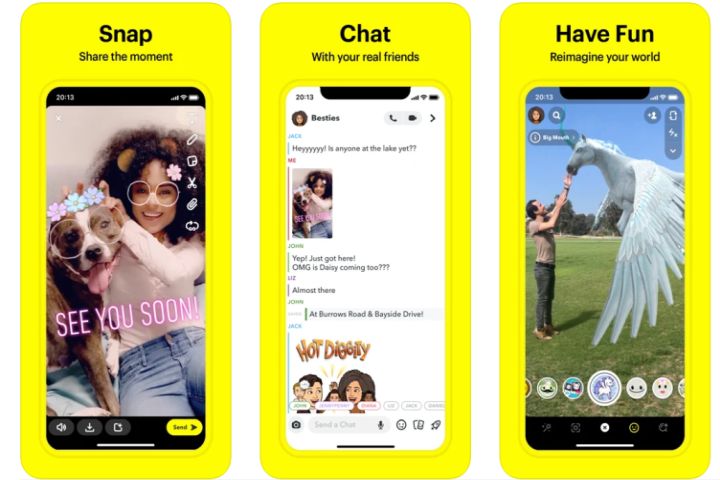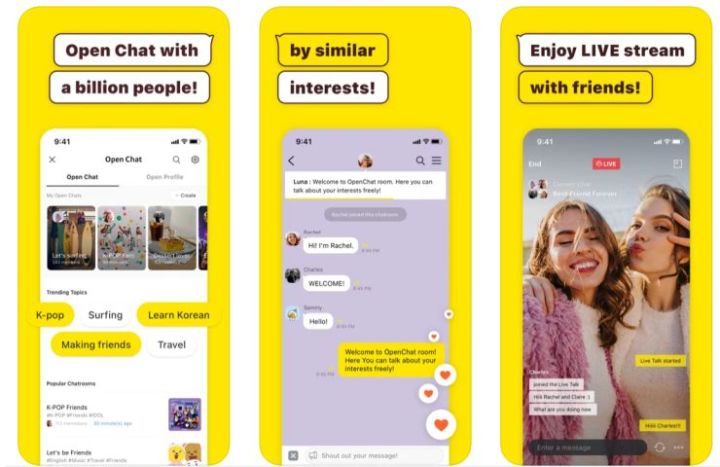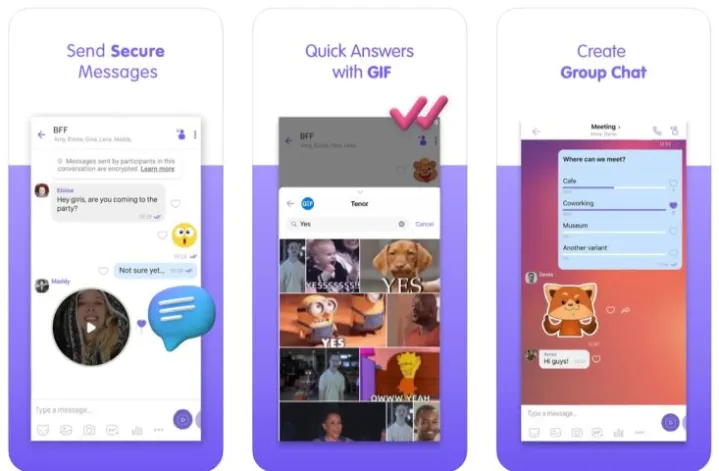Our smartphones enable constant and instant communication with our family, friends, and work colleagues. However, the built-in options out of the box aren’t always the best.
New messaging apps have appeared to provide rich services offering all kinds of interactions with others, from free text messaging to voice and video calling to photo and file sharing with the added benefit of encryption. We’ve tested out a lot of different options, so here are some of the best messaging apps you will find on both Android and iOS.
If privacy is a concern, you might want to explore our picks of the best encrypted messaging apps. Want to chat right from your desktop browser? Check out the best chat clients for PC and Mac.
See more
One of the most-used messaging apps in the world, WhatsApp is very easy to set up, and it’s free. You can chat and share things like your location, photos, documents, and contacts. You can also make video and voice calls, and the app supports group voice and video calls of up to eight people. The setup requires you to grant access to your contacts, so the app can automatically populate your contact list. One of the things that is so attractive about this app, other than its massive popularity, is the addition of end-to-end encryption for privacy and security, though it is owned by Meta (Facebook). It also supports GIFs and Snapchat-like editing features for fun. The latest new features include disappearing messages, which allow you to set your chats to disappear after seven days, and new custom wallpapers to brighten up your chats.
Messenger

Meta (Facebook) has its own separate messaging app that makes it very convenient to chat with friends and family. It will automatically populate your contacts, but you can also add a contact or allow someone to add you as a contact by scanning a unique code. There are plenty of free stickers, and you can send GIFs, too. The video and voice calls are clear and very reliable. On Android, the Chat Heads feature allows you to keep a chat icon floating on top of your screen, which is very handy. You can also share files, share your location, and send money in some markets — or even start a secret conversation that is end-to-end encrypted. With the new Messenger Rooms feature, you can host up to 50 people, create a link to your chat, and share it with anyone, even if they’re not on Meta. You can also opt in to vanish mode, where your messages disappear after you exit the chat, or enjoy Watch together, which lets you watch TV shows, movies, and videos with your friends over video chat in real time.
Telegram
Boasting millions of active users, Telegram bills itself as the fastest messaging app around. It works across devices on mobile and desktop platforms. You can store chat history in the cloud, share files with no limit on size, and chats are secured with 256-bit symmetric AES encryption, 2048-bit RSA encryption, and Diffie-Hellman secure key exchange. There is support for stickers and GIFs, photo and video editing, and group chats for up to 200,000 people. Telegram is also completely free and doesn’t contain ads. Funded by a donation, the app’s makers promise it will stay free, will never sell data, and isn’t aiming to generate revenue. New features include animated stickers for photos or videos, a new media editor that makes it easy to enhance video quality and add texts and stickers, scheduled voice chats, and the option to set messages to auto-delete after 24 hours or seven days of sending.
Signal
Signal, from Open Whisper Systems, is one of the most highly recommended apps when it comes to chat encryption and security, and has become a popular alternative to WhatsApp if you’re concerned about privacy. This app has military-grade encryption for all your messaging and voice calls. It supports texts, voice calls, group messages, and sending media attachments. Edward Snowden famously recommended this app, which makes it a top pick for people who are looking for security, first and foremost. The latest updates include the ability to blur features in an image editor, dark mode, new sticker packs, the option to react to any message with emoji, a new 8-hour mute setting to silence notifications while you’re asleep, and chat wallpapers.
Skype
Skype is another popular app that lets you text and call people anywhere in the world. You can use the app on your phone as well as on your desktop for easy access. The app lets you share screens, join free video calls, record conversations, and share files, which can be useful for both personal and professional use. To make your experience better, the video call feature also offers noise suppression, custom reactions, and Together mode where you can see all the participants at once.
Discord
Discord first launched in 2015 as a chat app to keep gamers connected while they played together. Today, nearly 300 million users worldwide use the free app for a variety of different chat purposes. In fact, the company logs at least 14 million active users every day. Discord allows the option for private group chats, with up to 10 friends in the space at a time. If gamers are worried that typing out chats could get in the way of their gameplay, they can use Discord’s voice chat feature for hands-free communication. Today, clubs and communities use Discord to stay in touch and facilitate meetings. It’s also an excellent way to meet people online because many digital communities form Discord groups to keep people connected. We do want to point out that Discord does not use end-to-end encryption for its messages. If total privacy is a priority, use an alternative app to keep your messages safe.
Snapchat

Snapchat was an instant must-have for younger generations from its first launch, despite it later being popularized and capitalized on by celebrities. While this app’s ratings don’t quite reach as high as Instagram’s, it still does its intended job excellently. Users can communicate with friends and family through short videos, brief photos, or text messages that eventually disappear. These media messages are fleeting; they’re typically on one’s screen for a few seconds before they’re automatically deleted. You and your friend can continue to send “snaps” back and forth, and the messages will generally disappear every time. The app comes with several fun filters and photo editing software, and it’s Bitmoji compatible. Snapchat supports larger-scale group chats with all your friends. The company has undoubtedly made a strong home in the corner of the bite-sized communications market. The latest features include the ability to save photo and video Snaps, and the option to create, send, and view Snaps while on a Snapchat call.
Threema ($5)
Threema is a totally anonymous app that uses the NaCI cryptography library to protect your messages. Each time you open the app, a unique ID Key is generated, so you can send messages anonymously — or choose to associate your messages with a phone number or email address. Threema offers end-to-end encryption for text, voice, video, and photo messages, and you can share files up to 50MB. There’s group messaging, a handy polling system that lets you quickly gauge the opinion of family and friends, and a desktop version, so you can carry on chatting while you’re at work. There are also personal QR codes you can scan to quickly verify contacts.
Wickr Me
Wickr Me is a secure messaging app that lets you send private text, photos, voice and video messages, with end-to-end encryption. Messages self-destruct, with a configurable timer and a Shredder feature that securely erases attached files, photos, and other data. You can start individual conversations or join group chats of up to 10 participants, and you don’t need an email address or phone number to register with the app. Wickr Me takes security seriously, with device-to-device encryption that’s almost impossible to break. The latest features include the ability to pin your favorite chats and groups to the top of your conversations list, for easy access.
KakaoTalk

The most popular text messaging app used in South Korea is also available in the U.S. Known for its fast and reliable messaging no matter what network you’re connected to, KakaoTalk has become the go-to for many. A standout feature is the integration of e-commerce in the app. KakaoTalk gives users exclusive coupons and deals from popular brands to share with their friends and family. The app has gotten so popular for transactions that it now offers branded credit cards that users can use with their virtual currency. Bonus features include being able to create your own calendar and schedule appointments and reminders for lunches, work meetings, or gatherings. The app recently added group video chat to its features, so you can get together with your friends.
Line

Line is a very popular app, especially in Asia, and it boasts more than 600 million users. As well as all the standard features of a messaging app, there is a timeline similar to Meta (Facebook), where you can post and your friends can comment on your posts. Calls to landlines and free Line to Line video or voice calls are available. There’s also a very healthy store of stickers packed with Line characters that are famous in Asia. Group chat allows for chats of up to 500 participants, and there’s support for encrypted chats. You can also follow artists and brands on Line. It even allows you to set up albums and share them with friends or watch YouTube videos together while in a call.
Kik
Kik is the messaging app of the youth. Unlike many applications that require you to link to a phone number, Kik only requires a username to start texting. Adding your friends and loved ones is as easy as scanning their unique Kik QR code with your phone camera. The interface is fun and user-friendly — you can even play games inside your chat rooms! With almost 70% of the user population between ages 13 and 24, Kik is a great way for teens and young adults to interact and make new friends.
Viber

With more than 1 billion users worldwide, this popular app will automatically add your contacts. It allows you to send text messages, stickers, and emoji, make video and voice calls, and share your favorite photos. Color-coded encrypted messaging is also available, along with group chats, and self-destructing chats. Viber Out is a feature that allows you to make international and domestic calls at low rates. Viber-to-Viber calls are always free. The most recent additions are a dark mode, a short-story feature called Shorts, and a create-your-own-GIF feature, which lets you turn a video from any chat into a GIF — plus the addition of Viber Communities, where you can create your own community on a shared topic or passion, and invite others. You can also now enjoy group chats with up to 250 people, and group video calls with up to 40 participants.
WeChat is the most popular app in China with more than 1 billion users. It offers the usual messaging app features like photo sharing, or video and voice calls. But with WeChat, you also get features like location sharing to help you find friends who are nearby, and you can share moments or snapshots of your day. You can now group chat with up to 500 people, and enjoy group video calls with up to nine participants. This app also supports payments, games, and much more. It’s available for Wear OS and Apple Watch, too. The latest additions include a dark mode and the option to quote a previous message when replying or sending a new message.
Dust
Dust bills itself as “the world’s most secure messenger,” so if privacy is a concern, it might be worth a download. The app is free, and all messages are erased after 24 hours. You can unsend a message at any time, deleting it off the recipient’s phone in real-time — great for those “oops” moments — and the app will notify you if somebody takes a screenshot of your messages. Once messages are deleted from Dust, they can never be recovered, giving you complete control over your privacy. This is one of the most secure messaging apps around. The latest features include Blasts, where you can share your pictures and thoughts with your followers — they’ll expire after 24 hours, just like messages.
GroupMe
As its name implies, it’s no surprise that GroupMe is centered on facilitating group chats or direct messages with others. It’s essentially a text messaging app that also supports users as they send other forms of media or entertainment too, like photos and voice memos. GroupMe allows users to build group chats with up to 500 people, although we don’t recommend groups of that size unless you want a landslide of notifications. You can add contacts by email address or phone number. One of the great features of this app is that you can communicate with contacts in the U.S., even if they don’t use the app. Swap images, GIFs, videos, and use GroupMe’s custom emojis with your friends. Microsoft owns the app, but they haven’t developed end-to-end encryption for this service yet. While the Microsoft name may leave you feeling confident, to ensure your privacy, you may want to consider a different chat option instead. The app’s latest updates include the ability to send your videos as GIFs, delete messages, and report concerns about messages with just one tap.
Editors’ Recommendations



